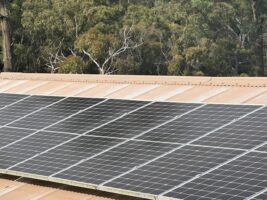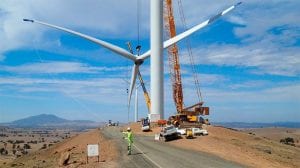Amongst all the sound and fury regarding the Government’s energy plan there is a central question going unanswered – what is the level of emissions reduction being proposed by the Government? And at what cost?
In September the Australia Institute’s climate & energy program released modelling analysis that demonstrated the most economically efficient path to meeting Australia’s international commitments – made when Tony Abbott was PM – would see the electricity sector reducing emissions by between 40%-55% below 2005 levels by 2030.
Of course the Paris commitment made by Tony Abbott was to reduce Australia’s total emissions by 26-28%, which is too low, but at least it is a start. It is the political baseline. At the time it was widely seen as inadequate with higher targets recommended by the independent Climate Change Authority and other parties adopting more ambitious targets in line with the science.
If we accept the baseline then we have to see how to achieve it, at lowest cost. What happened yesterday is that the PM has decided electricity – which is the most efficeint way to reach Abbott’s 26% for the country – will not deliver its economically efficient potential, which is at least 40% for the sector.
The impact of this is that either the PM has abandoned Abbott’s miserly 26% reduction, or he has decided we will embark on more costly emissions reductions, for example in agriculture or transport. As it happens, The Australia Institute believes many of these changes are desirable and certainly necessary according to the climate science. But the point is they are more expensive than renewables and energy efficiency and the PM needs to admit that.
The good news is that increasingly, electricity sector reductions will come at a negative cost. We will be able to cut emissions and electricity bills at the same time. Solar, wind, batteries and demand response are getting cheaper all the time and the investors are rushing in. Clean energy will reduce wholesale energy costs, cut the duration and height of peak price events and deliver more power to consumers.
But for this inevitable victory of clean over dirty energy to really deliver for the consumer, Australia needs a clear and honest plan.
While most of the climate debate has centred around emissions from the electricity sector most of Australia’s emissions come from other sources – agriculture, land clearing, transport etc. Once the clean transition for electricity is sorted, the climate conversation will move on to other areas and exciting low carbon approaches. Farmers, for example, may be surprised to find that they will have to do some impressive, heavy lifting. That of course relies on the premise that the government is serious about meeting even those low-ball Paris targets agreed to by Tony Abbott.
Given the low 26% target for electricity sector confirmed yesterday there must be a real question mark over that now. It is this low trajectory that is at the heart of what is wrong with the government’s plan announced yesterday. It is the ends, rather than the means, that are most important.
The Government estimates that this 26% target will equate to 28-36% renewables penetration by 2030. This is even less than the business as usual scenario modelled by Finkel. That is, the government plan will essentially restrict the development of renewables. So according to the chief scientist’s work there would be more renewables in the system by 2030 if the Government did NOT implement this plan.
We have come a long way when the government opts for a system to slow down the transition to clean energy that the market was essentially going to deliver on its own.
Critically, while there has been much focus on the fact that the government’s energy plan will be done through COAG and not the Federal parliament, the 26% target for electricity sector will be put in federal legislation.
Unless we grapple with just how weak this plan is in reducing emissions, it will be very difficult to prosecute for higher ambition in the future and we risk either failing the Paris targets or having to cut emissions from other sectors in an economically inefficient way.
And all this is going on at a time when the prices of renewables have plummeted to mean that new build renewables is far cheaper than building new coal, diesel or gas-fired power stations.
Of course existing coal fired plants built with huge subsides, almost all them paid for entirely by the taxpayer, with their sunk capital costs, are often cheaper. But they are getting older, more costly to run and are, as we have seen with Liddell, increasingly unreliable. Australia has one of the most carbon intensive electricity networks in the OECD so if there is any chance of meeting our Paris targets we will need to shut more of this historically subsidised coal power, sooner.
One of the central tenets of economics is the ‘law of demand’ which suggests that as the price of something falls people will tend to buy more of it. So if the price of renewable energy falls you would expect that as a community we would be keen to buy more renewable energy, not less. But alas as the modelling analysis shows, the current debate isn’t about economics.
Politically, the risk to the government remains the high levels of support for clean energy. A recent poll from The Australia Institute shows two thirds of voters prefer demand response to new generation. Even the Australian’s polling this week showed massive support across all political parties for keeping support going for renewable energy. Renewable energy is more popular than any politician or political party in the country. If you are seen to walk away from renewables you will be seen as walking away from the public.
Ben Oquist is Executive Director of The Australia Institute.










